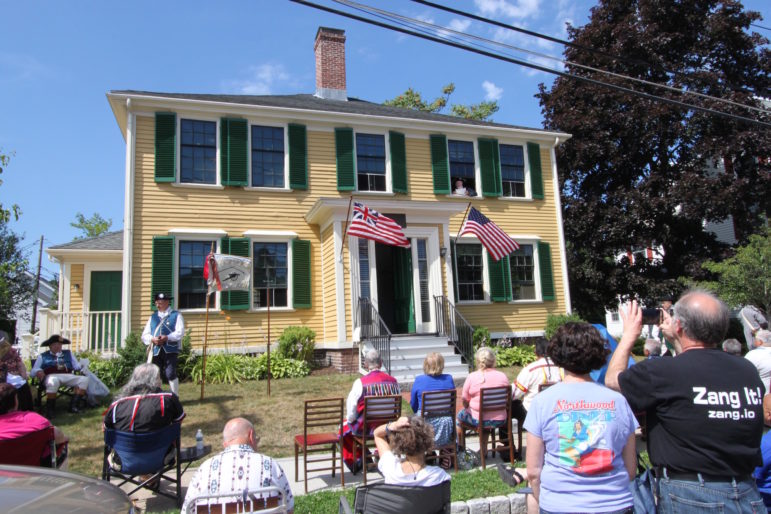
Charlie Breitrose The Edmund Fowle House in Watertown housed the Massachusetts Council in Revolutionary times. Sam Adams was among the members of the Council.
The following story is part of a series on local history provided by the Historical Society of Watertown. It was written by Historical Society President Marilynne Roach for the January 2009 Historical Society newsletter, “The Town Crier”. Marilynne is also on the board of the Watertown Historical Commission.
Samuel Adams
Samuel Adams, 1722-1803 − political activist, eventual governor of Massachusetts, and long-time thorn in the side of the British authorities − actually did frequent the Edmund Fowle House when, as a member of the Council, he and the others met upstairs in the early days of the Revolution, technically committing treason.
Sam also actually made beer. He inherited a brewery from his father, a politically active entrepreneur who provided his son with a Harvard education. This fitted Sam to be a gentleman but there were few openings for that. His mother hoped he’d become a minister but while Sam enjoyed public speaking he felt no call to a religious life. He tried learning how to be a merchant but life all day in a counting house was not for him. So his father put him in charge of the family brewery — on Purchase Street in Boston right next to their home — a microbrewery by today’s standards. Neighbors saw Sam lugging sacks of malt around and dubbed him “Sam the Maltster.”
His father and some colleagues tried to start a bank but because they didn’t go through the channels London required, the British authorities shut them down and Adams Sr. lost his shirt. This gave his son the focus he needed to begin a career agitating for local rule and, eventually, independence.
Sam paid so much attention to politics that he lost his brewery for mounting debts. When he was chosen as a delegate to the (illegal) Continental Congress in Philadelphia, his friends all chipped in and bought him a decent suit for the occasion so he wouldn’t embarrass them. When the local legislature became too uncooperative with the British authorities British military Governor Thomas Gage dissolved the elected legislature and appointed loyal subjects.
The rebels met anyway in places like Concord which is what they were doing when the War of Independence began. Sam and fellow delegate John Hancock had to hide in the woods while the April 19th battles raged. Then, once the British army was besieged in Boston, the legislature moved here to Watertown − the main body working in the meeting house that was in the burying ground at the corner of the present Mt. Auburn and Common streets, and the council in Edmund Fowle’s nearby house. Because the upstairs was unfinished the Council was able to complete the available apace and make as big a room as possible.
So Sam Adams and John Hancock, cousin John Adams and others ran the war from Fowle’s house until they left for the Continental Congress in Philadelphia. The rest of the council & innumerable committees remained and everyone seemed to pass through at one time or another in the year and a half the government was headquartered here.
After a brief return to Massachusetts in August of 1775 (and to Watertown of course) Sam and cousin John headed back to Pennsylvania. During that trip John taught Sam how to ride a horse, a necessary skill learned with the help of a custom-made pair of padded flannel underdrawers. (You do what you have to do for your country.)